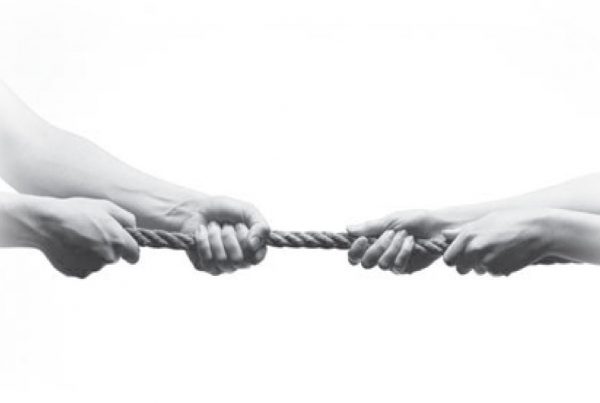
If your partner said to you: “I’m worried that we’re spending too much – our credit card bill is out of control”, how would you respond? Would you say something like “Don’t blame me! You’re the one who keeps wanting to eat out” or “Why did you have to bring that up just when we were getting along?” If so, you may be falling into the defensiveness trap.
It’s natural to be defensive when you feel attacked. But wait a minute – is “I’m worried that we’re spending too much” an attack? Well actually, it’s not. It’s healthy communication. So why get defensive? Because we get defensive when we feel attacked, whether or not we actually are being attacked. There are many reasons people can feel attacked even when it’s not happening. They might have been attacked with criticism growing up and so became hypersensitive to the threat of attacks. They might feel they aren’t good enough and live in constant fear that others will see this. In this case, they are always anticipating a negative remark because they believe it about themselves. The defensiveness makes sense in both cases. It makes sense, but it isn’t helpful.
Defensiveness is a problem because it pushes people away and it is an obstacle to problem solving. When couples get repeatedly defensive (occasional defensiveness can be manageable, so long as it is very occasional), they can’t move forward on the issues that are important to them. When that happens, they add another brick to the wall that sits between them. The emotional brick wall then becomes another obstacle to problem solving because it raises questions of their partner’s good intentions. When you aren’t confident your partner has your interests in mind, it is hard to work as a team. So if you want to get stuck in the same old problems and spin around and around with them, defensiveness is your answer.
But most of us don’t want to stay stuck in problems. We want to solve them and move forward. So how do we break out of defensiveness? John Gottman has studied successful and unsuccessful couples for several decades. He says the antidote to defensiveness is listening. Listening can be hard when you are already feeling defensive so you need to first calm yourself emotionally. Don’t say anything – just pause and breathe. Then, if it helps, you can say the obvious: “I’m trying to not be defensive”. If you are able to calm yourself, then you can go into listening mode. Ask questions to understand the other person, like “What options do you see?”, “What else is important about this for you?”, “What worries you?”, “What do you feel hopeful about in this?”, etc. If you can shift your attitude to one of being curious about the other person’s perspective, it can help you to realize you don’t have to agree with someone to understand them. The way I do this in my own marriage is I wait until I am calm and then approach my partner with “I’m feeling upset about . Where are you at with it?” If you tend toward defensiveness, a helpful motto is “seek first to understand, then to be understood.”
If you are in a relationship with someone who gets stuck in defensiveness, there are strategies you can try too. You can check whether you are inadvertently triggering the defensiveness by the tone or words you use to raise concerns. The most non-threatening way to raise a concern is to talk about yourself and your feelings. This means using the word “I” a lot (and not “you”) and putting some feeling words in there, like “I’m worried about our finances”, “I’m feeling lonely lately and would like to spend more time together”, or “I want to feel closer to you but I’m feeling stuck and need your help”.
Remember that defensiveness is a sign that someone feels emotionally unsafe. Being curious about this can help you stay calm and not vilify your partner. You can ask yourself what this might be about for your partner. Also think about what someone who feels unsafe might need. What do you need when you feel unsafe? Most of us need things like gentleness, comfort, and reassurance. Some of us need space. The problem with space though is that it can start to become a barrier in the relationship. Monitor how much space you are okay with and when it crosses a line that makes you feel disconnected from your partner.
Sometimes when someone is defensive just saying the obvious can be helpful, as in “Are you feeling attacked right now?” and asking “What do you need?” This needs to be done with a gentle tone and body language that suggests your partner is safe with you.
If you are unable to break out of a pattern of repeated defensiveness, it may be time for professional help. Defensiveness can erode relationships and the longer it goes unchecked, the more difficult it can be to restore the relationship.



